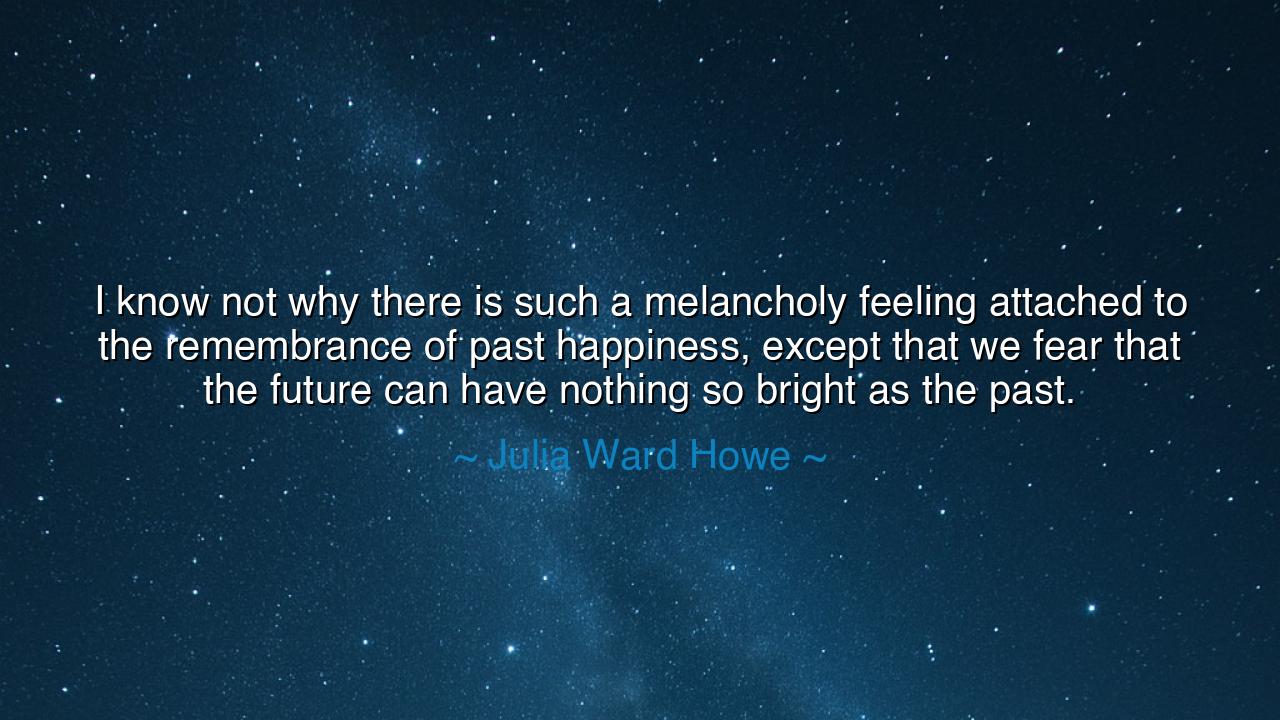
I know not why there is such a melancholy feeling attached to the
I know not why there is such a melancholy feeling attached to the remembrance of past happiness, except that we fear that the future can have nothing so bright as the past.






Hear me, O children of time, for the words of Julia Ward Howe resonate with the deep ache of the human soul. She spoke—"I know not why there is such a melancholy feeling attached to the remembrance of past happiness, except that we fear that the future can have nothing so bright as the past." In these words, Howe touches upon a profound truth about the nature of memory, nostalgia, and our fear of the unknown future. How often, when we reflect upon the moments of past happiness, do we feel a shadow of sorrow, a sense that those days may never return, and that what lies ahead will never shine so brightly?
What is it that causes this "melancholy feeling," as Howe so eloquently calls it? It is not merely the loss of happiness, but the fear that the future can never measure up to the brightest days of the past. Our minds, in their natural tendency to reflect upon what has been, often cling to memories of joy, of love, and of peace, moments that seem more perfect, more complete than anything we can imagine ahead. And so, we fear that the future, with all its uncertainties, may never be able to offer us the same brilliance, the same joy that we once knew. This fear, O children, is universal, for it is the human condition to compare the unpredictable future with the certainty of what has passed, and to believe that the best days are behind us.
Consider the tale of the great Achilles, the hero of the Iliad, whose greatest victory came at the height of his power. Achilles, like many great warriors before him, believed that his greatest days—the days of glory, honor, and strength—were the pinnacle of his life. But in the shadow of his greatness, he could not escape the fear that the future would offer nothing but loss. Even his victories, earned through blood and strife, were haunted by the knowledge that he would one day grow weak, grow old, and be forgotten. In this, Achilles embodies the very essence of Howe’s words—the fear that the future can offer nothing so bright as the past, a fear that shadows even the greatest achievements.
In a similar way, the philosopher Socrates—whose teachings have endured through centuries—knew well the weight of reflection on the past. Socrates, in his final days, reflecting on the life he had lived, faced the looming uncertainty of death with a calm resolve. He understood that the future, though unknowable, was not to be feared. In his final words, Socrates showed us that while the past can hold moments of happiness, the future holds the potential for new wisdom, new growth, and new experiences that can be as powerful as any that have come before. Socrates did not look back with sorrow, but forward with the understanding that the best days of life are those that are lived, not in the shadows of what once was, but in the hope of what is yet to come.
What, then, is the lesson, O children? The melancholy that attaches itself to past happiness does not come from the loss itself, but from the fear that the future will not shine as brightly. This fear, this doubt, is natural, yet it is a lie. The future is not bound by the past, but shaped by the choices we make in the present. Every moment we live can hold the potential for joy, for greatness, for love—if we are willing to meet it with an open heart and mind. We must learn not to fear the future, but to embrace it with the same hope, courage, and determination that carried us through our brightest days. Just as the seasons change, so too does life move forward, bringing new joys, new challenges, and new possibilities.
Take heed, O children of the earth, for the future is not an empty void waiting to disappoint. It is a canvas, blank and open, waiting to be filled with the colors of our dreams and actions. While the past may hold memories of happiness, it is the present that shapes the future, and the future is as bright as we choose to make it. Do not let the past bind you, nor let the fear of what may come dim your light. Embrace the future with hope, knowing that the best is yet to come, even when it feels uncertain. The future, O children, is not something to fear, but something to create.
Thus, let us live with this wisdom, for the past is not a place to dwell, but a foundation upon which we build the life we are yet to live. The future is not a shadow cast by the light of what was; it is the light that we create through our choices, through our courage, and through our willingness to live fully in the present. Let go of the fear that the future cannot be as bright as the past, and instead step forward into the unknown, knowing that with each step, we shape the world to come. In this way, we live not in the shadow of past happiness, but in the full brilliance of the life we have yet to live.






AAdministratorAdministrator
Welcome, honored guests. Please leave a comment, we will respond soon